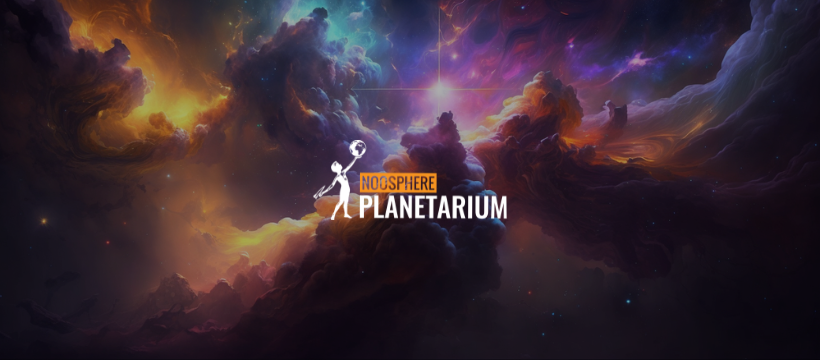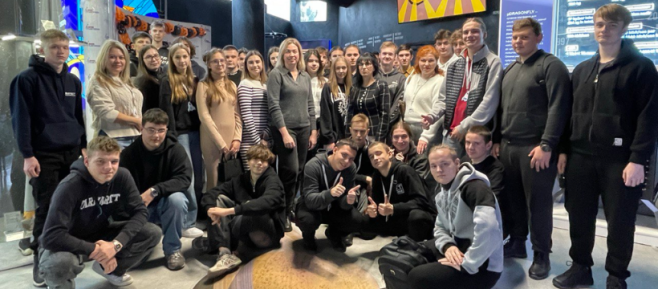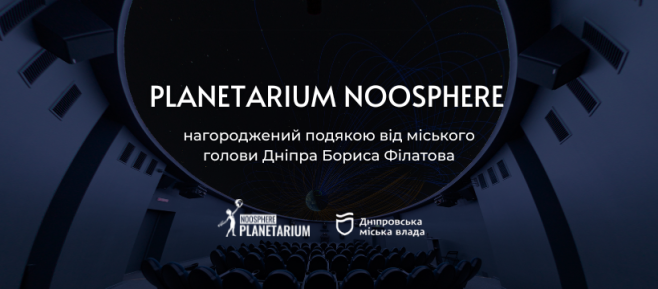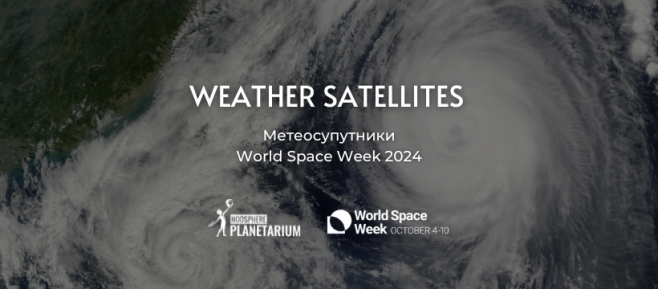Premiere of the summer program “Stars and Constellations”
24 May

On May 31, 2024, Planetarium Noosphere will host the premiere of the summer program “Stars and Constellations”. It will include an updated scientific exposition, a new exhibit “Gravity Scales”, new games on interactive tablets, the premiere of three thematic programs and the premiere of an exclusive full-dome cartoon produced by Planetarium Noosphere.
In the updated scientific exposition of Planetarium Noosphere, you will now be able to find out:

This is an incredible adventure of sisters Asteria and Zoryana, who go to the Carpathians to admire the starry sky. A young scientist Asteria will gladly help her curious younger sister Zoryana learn as much as possible about the stars.
A bright addition to the summer premiere will be thematic programs that will allow every guest of Planetarium Noopshere - from young travelers to adult space enthusiasts - to plunge into new space adventures.
1. “Planets’ Quest of Captain Rabbit” (4+)
Let's go on a space journey with Captain Carrot - a little bunny who wants to find out if it is possible to grow delicious and crispy carrots on other planets of the solar system. Together with Captain Carrot, you will learn about the structure of the solar system, memorize the names of all the planets, and find out where it is hottest and coldest in the solar system. You'll get caught in a rainstorm on Venus, dive into Saturn's rings, glide across Pluto's surface, and solve the mystery of the Moon Bunny.

2. “Celestial Guides: Navigating with the Stars” (8+)
Since ancient times, people have been using the starry sky as a clock, calendar, and compass to show them the right way. The stars and constellations we see in the sky have been guiding sailors and travelers for centuries.
This thematic program will revive the skills of finding celestial landmarks. Together we will learn how to look for the brightest constellations and navigational stars that can be observed in the starry sky throughout the year, and learn how to distinguish stars from planets.

3. “Volcanoes in space" (12+)
Volcanic eruptions on Earth have played a leading role in the formation of land and the emergence of life in the deep ocean. They allow us to learn more about the interior of our planet and understand how continental plates move.
Can volcanoes spew more than just hot lava? Are there volcanoes on other planets and satellites? Where are there most of them and where is the highest volcano in the Solar System? How did the “seas” of frozen lava on the Moon form, and when was the last time volcanoes erupted there? How far can the water spewed by geysers on Enceladus travel in space, and how are they connected to Saturn's rings? Find out the answers to these questions during the Volcanoes in Space thematic program.

We are waiting for you at our space sessions!
In the updated scientific exposition of Planetarium Noosphere, you will now be able to find out:
- Can a planet have three suns?
- Why would an apple weigh 100 billion tons at a neutron star?
- What do the ghosts of extinguished stars look like?
- Can anything leave a black hole?
- What is special about zodiacal constellations?
- What constellations are easy to find in the sky in summer?
- What mythical creatures can be seen in the starry sky?
- Which starry sky myth is the most romantic?

This is an incredible adventure of sisters Asteria and Zoryana, who go to the Carpathians to admire the starry sky. A young scientist Asteria will gladly help her curious younger sister Zoryana learn as much as possible about the stars.
A bright addition to the summer premiere will be thematic programs that will allow every guest of Planetarium Noopshere - from young travelers to adult space enthusiasts - to plunge into new space adventures.
1. “Planets’ Quest of Captain Rabbit” (4+)
Let's go on a space journey with Captain Carrot - a little bunny who wants to find out if it is possible to grow delicious and crispy carrots on other planets of the solar system. Together with Captain Carrot, you will learn about the structure of the solar system, memorize the names of all the planets, and find out where it is hottest and coldest in the solar system. You'll get caught in a rainstorm on Venus, dive into Saturn's rings, glide across Pluto's surface, and solve the mystery of the Moon Bunny.

2. “Celestial Guides: Navigating with the Stars” (8+)
Since ancient times, people have been using the starry sky as a clock, calendar, and compass to show them the right way. The stars and constellations we see in the sky have been guiding sailors and travelers for centuries.
This thematic program will revive the skills of finding celestial landmarks. Together we will learn how to look for the brightest constellations and navigational stars that can be observed in the starry sky throughout the year, and learn how to distinguish stars from planets.

3. “Volcanoes in space" (12+)
Volcanic eruptions on Earth have played a leading role in the formation of land and the emergence of life in the deep ocean. They allow us to learn more about the interior of our planet and understand how continental plates move.
Can volcanoes spew more than just hot lava? Are there volcanoes on other planets and satellites? Where are there most of them and where is the highest volcano in the Solar System? How did the “seas” of frozen lava on the Moon form, and when was the last time volcanoes erupted there? How far can the water spewed by geysers on Enceladus travel in space, and how are they connected to Saturn's rings? Find out the answers to these questions during the Volcanoes in Space thematic program.

We are waiting for you at our space sessions!

Awarding the participants of the Astronomy Quiz: Space Exploration contest
On the occasion of the 80th anniversary of the Separate Structural Subdivision “Professional College of Rocket and Space Engineering of Oles Honchar D...

Planetarium Noosphere received a letter of appreciation from Dnipro Mayor Boris Filatov
On the occasion of the Day of Cultural Workers, on November 7, 2024, a solemn ceremony of awarding the most prominent representatives of the city's cu...

World Space Week-2024: Weather Satellites
How often do you check the weather forecast when planning your day or vacation?Weather satellites have been helping mankind monitor humidity and tempe...